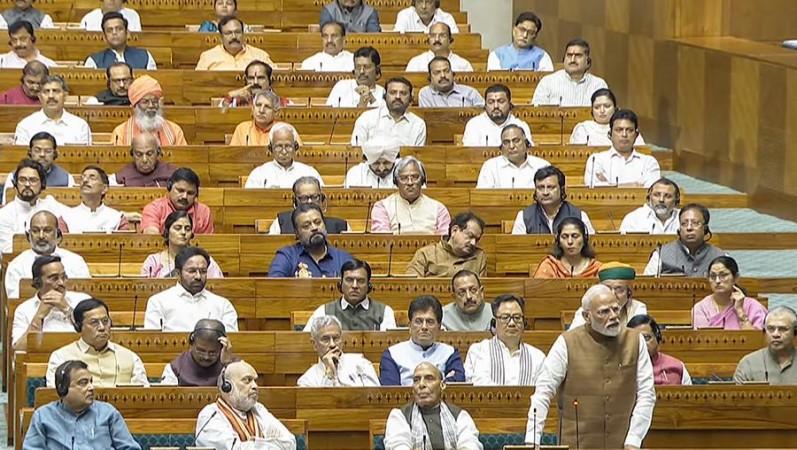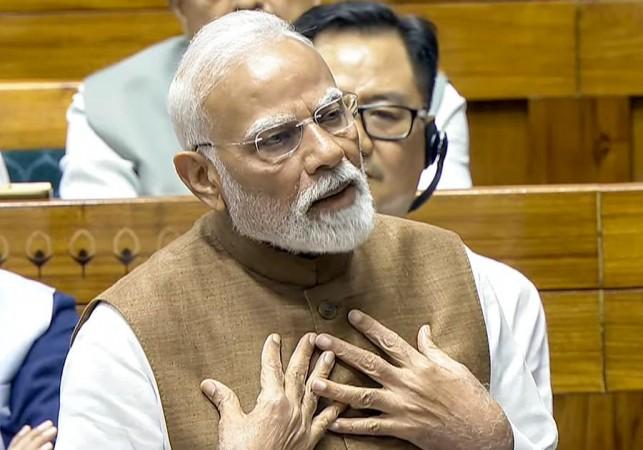
Prime Minister Narendra Modi recently addressed the Indian Parliament, firmly rejecting claims by U.S. President Donald Trump that he had brokered a ceasefire between India and Pakistan. PM Modi emphasized that no external nation had requested India to halt its military actions against Pakistan.
During a heated debate on Operation Sindoor in the Lok Sabha, Modi stated, "No leader in the world asked India to stop military action." This statement was made in the context of the April 22 Pahalgam attack, which India avenged with precision strikes.
PM Modi recounted a significant interaction with U.S. Vice-President J D Vance on May 9. Vance attempted to reach Modi while he was in a meeting with the army. Upon returning the call, Vance informed Modi of Pakistan's plans for a major attack.
PM Modi's response was resolute: "If this is Pakistan's intention, it will pay a heavy price," he declared, further asserting, "Hum goli ka jawab gole se denge (We will respond to bullets with missiles)."
The Prime Minister highlighted the swift military response to the Pahalgam attack, which was avenged within 22 minutes. He praised the armed forces for their ability to reach and destroy previously "impenetrable" targets, marking a significant achievement in India's defense capabilities. This decisive action underscored India's commitment to defending its sovereignty and combating terrorism.

Opposition's Concerns and Government's Response
The parliamentary session saw opposition parties, including Congress, DMK, and SP, questioning the government's handling of the situation. They raised concerns over the ceasefire announcement originating from the U.S. rather than India, accusing the government of surrendering diplomatic ground. The opposition also pointed to perceived security lapses leading to the Pahalgam attack and questioned the lack of evacuation of border villages despite ongoing mock drills.
In response, the government rejected allegations of mishandling, with PM Modi asserting that India's approach to terrorism has fundamentally changed. He declared that Pakistan's nuclear threats no longer intimidate India and that both terror and its sponsors will be treated as one.
"This is the same propaganda that is spread from across the border. Some people trust Pakistan's misinformation more than the facts given by our Armed Forces," PM Modi said.
Home Minister Amit Shah supported PM Modi's position, detailing the extensive investigation conducted by the National Investigation Agency (NIA). Shah revealed that 1,055 individuals were questioned over 3,000 hours to identify the terrorists involved in the Pahalgam attack. Ballistic and forensic analyses confirmed that the rifles recovered from the terrorists were the same as those used in the attack, and all three terrorists were identified as Pakistani nationals.
Operation Sindoor's Impact and International Dimension
The debate also touched on the broader implications of Operation Sindoor. PM Modi asserted that the operation had left the "masters of terrorism" in Pakistan sleepless, with Pakistani airbases still in a state of disrepair. He recounted how the Pakistani Director General of Military Operations (DGMO) pleaded for India to cease its attacks, highlighting the significant impact of India's military response.
PM Modi expressed gratitude to the nation for their trust during Operation Sindoor, stating, "I am indebted to the people of the country for showing trust in me during Operation Sindoor."
This sentiment was echoed in the broader geopolitical landscape, where out of the 193 countries listed in the United Nations, only three supported Pakistan during Operation Sindoor.
In a lighter moment, PM Modi took a jibe at Pakistani Prime Minister Shehbaz Sharif, who admitted to being swimming while India launched precision strikes. PM Modi praised the Indian armed forces for their decisive action, which was executed with a free hand to target terrorist infrastructures.














